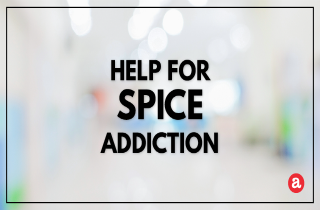Spice addiction help
Can Spice be addictive? You bet. Spice products contain a mixture of natural herbs sprayed with man-made compounds which produce hallucinogenic effects. Common effects of Spice products include elevated mood, relaxation, and altered perception. However, dangers of fake weed are real. Spice withdrawal and Spice addiction symptoms have been reported by regular users. So what can you do if you are in need of Spice addiction help?
Here, we review Spice addiction treatment options and where to go for Spice addiction help. Then, we invite your questions about Spice and addiction at the end.
How to help Spice addiction
Spice addiction treatment follows three important phases. First is withdrawal and detoxification of Spice from the body. Second is long-term physical treatment and stabilization. The third phase of treatment addresses psychological compulsion to use Spice.
1. Spice withdrawal treatment
Detoxification of Spice eliminates cannabinoid compounds and their toxins from the body and brain after chronic Spice use. Nightmares, profuse sweating, nausea, tremors, and headaches are some of the most commonly reported withdrawal symptoms by people experience while detoxing from Spice. This is why the initial phase of Spice withdrawal is best completed in a detox center. The process can last from a few days to a few weeks, depending on the severity of physical dependence on Spice.
2. Physical stabilization and treatment of Spice PAWS
During withdrawal treatment, you can experience good and bad days. Post-acute withdrawal or the PAWS stage of Spice withdrawal occurs as the body physically readjusts to the absence of cannabinoids over time. Spice PAWS can be characterized by emotional and physical symptoms like depression, insomnia, impaired motor skills, and cravings. In fact, it can take a while for your brain chemistry to return to normal after Spice use. This cycle of emotional and mental imbalance can put you at risk of relapse. To stay on top of your health, seek help from medical professionals who specialize in diagnosing and treating Spice PAWS and who can prescribe antidepressant medications, if necessary.
3. Psychological treatment of Spice addiction
Spice addiction can cause compulsive and addictive behavior. To help you take control of your own life again, it is highly recommended that you see an addictions counselor (a licensed clinical psychologist) and attend drug addiction support groups. During counseling, you will be taught how to recognize and manage psycho-emotional thoughts. The counselor will also teach you important life skills to help you overcome setbacks and prevent relapse. Support groups can help you recognize and change negative thought patterns. Plus, they help you feel a part of something larger than yourself.
Getting help for Spice addiction
Addiction is treatable. Overcoming Spice addiction starts by recognizing that there is a problem and that you need assistance. Who do you call for help?
Family and Friends
It is difficult to go through recovery all by yourself. The support you can get from family and friends is very important. They can help you focus and ultimately, achieve your goals.
Addiction professionals
Psychologists and psychiatrists specialize in different types of addiction therapies and can provide encouragement and motivation for you to continue treatment. They can also teach you different coping strategies that will help you handle stress and setbacks. Psychiatrists can provide mental health support and can also prescribe medications, if needed, to treat underlying mood or mental health disorders.
How to help a Spice addict
Intentionally ignoring an addiction can only contribute more to the problem. There are many ways family members can help their loved ones overcome Spice addiction problems. First, you can do your research about drug addiction as a brain disease. Second, you can seek help from a therapist or counselor who specializes in addiction or family therapy. Professionals offer guidance not just for the addict, but also to the other members of the family so that they can understand that addiction is a disease and it is highly treatable. If you know someone suffering from spice addiction, here’s are some practical suggestions for things you can do to help:
- Recognize that there is a problem and speak with a professional therapist.
- Research about Spice addiction and ask for help from a psychiatrist who specializes in treating hallucinogenic drug addiction.
- Find and identify support groups and organizations that offer programs for families and friends of Spice abusers.
- Show that you care and stay positive even if your loved one is being negative. However, avoid enabling the Spice addict. Do not give the addict money and do not allow an active addict to stay in your home. Show detached love by supporting positive steps but do not encourage negative, addictive behaviors.
Spice addiction helplines
Address Spice addiction and call the following helplines:
1-800-662-HELP
The Treatment Referral Helpline – This hotline is offered by the Substance Abuse and Mental Health Services Administration. They refer callers to the appropriate treatment facilities. Local organizations and support groups.
1-800-784-6776
The National Alcoholism and Substance Abuse Information Center – This hotline number will help you find treatment and detox centers any place in the U.S.
1-800-273-8255
National Suicide Prevention Lifeline Phone – Get connected to a skilled, trained counselor at a crisis center in your area 24/7.
Help With Spice addiction questions
Stil have questions about Spice addiction? Feel free to share your queries and experiences about the topic and we will respond to you personally as soon as possible.









Related Posts